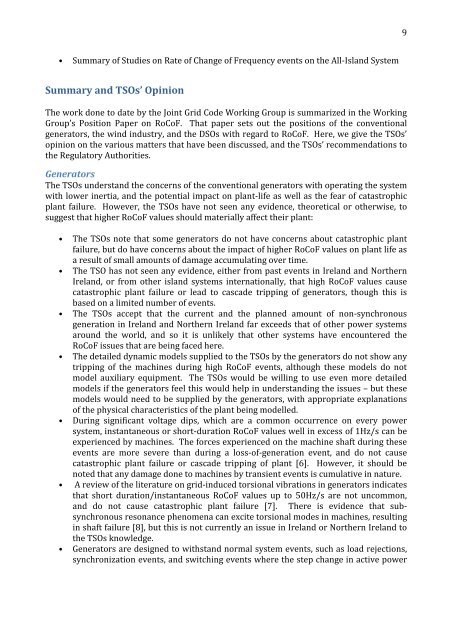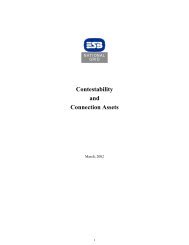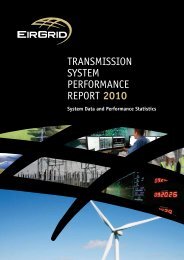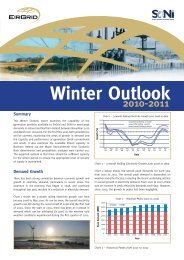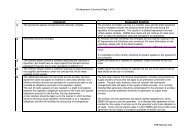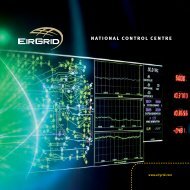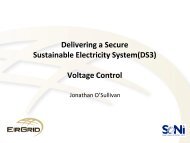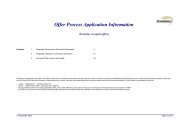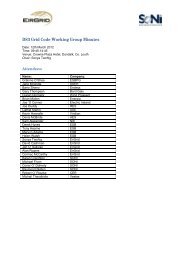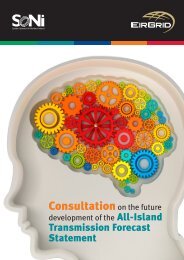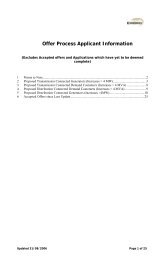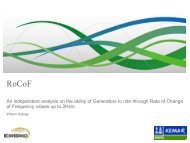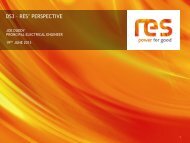RoCoF Modification Proposalâ TSOs' Recommendations - Eirgrid
RoCoF Modification Proposalâ TSOs' Recommendations - Eirgrid
RoCoF Modification Proposalâ TSOs' Recommendations - Eirgrid
Create successful ePaper yourself
Turn your PDF publications into a flip-book with our unique Google optimized e-Paper software.
9• Summary of Studies on Rate of Change of Frequency events on the All-Island SystemSummary and TSOs’ OpinionThe work done to date by the Joint Grid Code Working Group is summarized in the WorkingGroup’s Position Paper on <strong>RoCoF</strong>. That paper sets out the positions of the conventionalgenerators, the wind industry, and the DSOs with regard to <strong>RoCoF</strong>. Here, we give the TSOs’opinion on the various matters that have been discussed, and the TSOs’ recommendations tothe Regulatory Authorities.GeneratorsThe TSOs understand the concerns of the conventional generators with operating the systemwith lower inertia, and the potential impact on plant-life as well as the fear of catastrophicplant failure. However, the TSOs have not seen any evidence, theoretical or otherwise, tosuggest that higher <strong>RoCoF</strong> values should materially affect their plant:• The TSOs note that some generators do not have concerns about catastrophic plantfailure, but do have concerns about the impact of higher <strong>RoCoF</strong> values on plant life asa result of small amounts of damage accumulating over time.• The TSO has not seen any evidence, either from past events in Ireland and NorthernIreland, or from other island systems internationally, that high <strong>RoCoF</strong> values causecatastrophic plant failure or lead to cascade tripping of generators, though this isbased on a limited number of events.• The TSOs accept that the current and the planned amount of non-synchronousgeneration in Ireland and Northern Ireland far exceeds that of other power systemsaround the world, and so it is unlikely that other systems have encountered the<strong>RoCoF</strong> issues that are being faced here.• The detailed dynamic models supplied to the TSOs by the generators do not show anytripping of the machines during high <strong>RoCoF</strong> events, although these models do notmodel auxiliary equipment. The TSOs would be willing to use even more detailedmodels if the generators feel this would help in understanding the issues – but thesemodels would need to be supplied by the generators, with appropriate explanationsof the physical characteristics of the plant being modelled.• During significant voltage dips, which are a common occurrence on every powersystem, instantaneous or short-duration <strong>RoCoF</strong> values well in excess of 1Hz/s can beexperienced by machines. The forces experienced on the machine shaft during theseevents are more severe than during a loss-of-generation event, and do not causecatastrophic plant failure or cascade tripping of plant [6]. However, it should benoted that any damage done to machines by transient events is cumulative in nature.• A review of the literature on grid-induced torsional vibrations in generators indicatesthat short duration/instantaneous <strong>RoCoF</strong> values up to 50Hz/s are not uncommon,and do not cause catastrophic plant failure [7]. There is evidence that subsynchronousresonance phenomena can excite torsional modes in machines, resultingin shaft failure [8], but this is not currently an issue in Ireland or Northern Ireland tothe TSOs knowledge.• Generators are designed to withstand normal system events, such as load rejections,synchronization events, and switching events where the step change in active power


